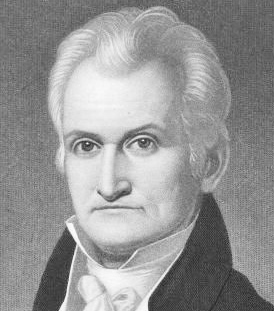Get Today in Masonic History into your Inbox. Sign up today for one of our email lists!
Need an article for your Trestleboard/Newsletter see our Use Policy
William Polk Passes Away

Today in Masonic History William Polk passes away in 1834.
William Polk was a American soldier in the continental army.
Polk was born in Mecklenburg County, North Carolina on July 9th, 1758. From the beginning of the rebellion against British rule, Mecklenburg County was active in the revolution. Polk's father was the commander of the local militia. It is also claimed that Polk's father was involved with the Mecklenburg Resolves which was drafted shortly after Lexington and Concord. It is sometimes confused with the Mecklenburg Declaration of Independence which is claimed to be the first Declaration of Independence drafted in the American Colonies. Polk followed suit with his father as did his brothers when it came to the fight for independence.
When the American Revolution started, Polk left Queens College to accept an appointment as a second lieutenant in the Continental Army. He was assigned to the Third South Carolina Regiment under his uncle. In December of 1775, he was wounded in a campaign to subdue Tory forces. It is claimed that his was the first American blood shed south of Lexington and Concord.
After nine months healing from his badly infected wounds, Polk, in 1776 was promoted by the provincial congress in North Carolina to the rank of Major. He was assigned to the Ninth Regiment after his promotion. The unit was ordered north and their colonel and lieutenant colonel remained in North Carolina for recruiting. As a combat veteran, Polk was given command of the unit. He marched the unit up to Trenton, New Jersey where they joined with the main body of George Washington's troops.
In 1777, Polk was wounded again. This time he was shot in the mouth while giving an order. The musket ball broke 4 of his teeth and his jaw. While recuperating, Polk remained with the regiment during the harsh winter at Valley Forge.
Polk served throughout the war in various duties, including recruiting. His final battle in the Revolutionary War came at Eutaw Springs. It was the final battle in the south prior to the battle of Yorktown.
After the war, Polk was nominated for political office on several occasions. He was never successfully elected. Polk become active with the American Colonization Society. The organizations purpose was to establish a colony made up of free Africans in the United States. The organization was made up of people from slave owners to abolitionists and activists seeking to help free slaves start a new life. The colony became modern day Liberia.
Polk passed away on January 14th, 1834.
Polk was a member of Phalanx Lodge No. 31 in Charlotte, North Carolina. He was the 5th Grand Master of the Grand Lodge of North Carolina serving from 1799 to 1801.
This article provided by Brother Eric C. Steele.

